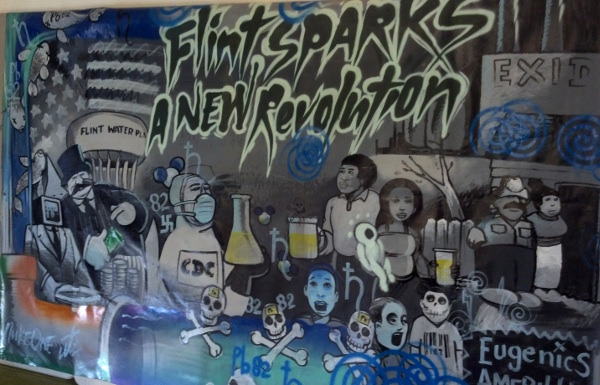
LOS ANGELES, CA — The poisonous policies impacting Flint, Michigan allows for deeper conversation regarding ongoing partnerships between government and corporations. These ill policies provide the impetus toward an independent political movement fighting the poison surrounding such corporate-government partnerships.
These poisonous policies endanger lives beyond any one city, state and/or country. We have been inflicted by multiple incidences of contamination. The fight for public ownership of water and the environment on behalf of our interests, taking it away from privatization for the sake of our wellbeing, is necessary.
Policy and profit become more important than human life. To date, the lives of over 200,000 people in Flint, Michigan, and the South East of Los Angeles (SELA) are now severely impacted by lead contamination. As active residents of South East of Los Angeles, we are in the midst of environmental violence. We continue organizing to ensure awareness of health risks, which impact our emotional and physical health.
The source of lead contamination in South East of Los Angeles is Exide Technologies. Exide’s focus is battery recycling. It processes over 25,000 car batteries annually. Exide was allowed to operate for over 33 years with a temporary permit, renewed annually, and approved by the Department of Toxic Substances Control, an agency of the state of California.
During its years of operation, Exide amassed over 100 health violations, which included both lead and acid leaks, and large foundational cracks causing high levels of lead in the soil outside company grounds. In total, Exide paid over $800,000 in fines. Importantly, since 2015, Exide has been permanently closed. Exide has also seen facilities in both Pennsylvania and Texas closed by regulators. In fact, in 2001, it was ordered to pay fines totaling $27.5 million for knowingly selling defective car batteries, leading to their CEO being sentenced to ten years in prison.
This all leads to an important question regarding such poisonous policies: why allow a company with continual disregard for environmental safeguards to operate without care for the health of communities for so long, if at all?
Often, small-knit communities are at the mercy of politics from government officials who favor manufacturing businesses over environmental health. It is a culture of power. Sean Hecht, UCLA Environmental Law Professor, suggests that governmental regulatory agencies play into threats from companies about their bottom dollar, saying that more regulations will lead to future closures. These threats impact how laws are made and obeyed. The actions existing between government and corporations are complicated because they choose for it to be. Decisions such as these, as with Exide, allow businesses to create distrust in communities.
Corporate business, and the money it generates, dictates immorality: the environmental health of communities and its own workers are impacted by poisonous policies by government and business. We need to redefine what democracy truly means through the very nature of collective ownership. The solutions are with us and require us to be attentive and active.
